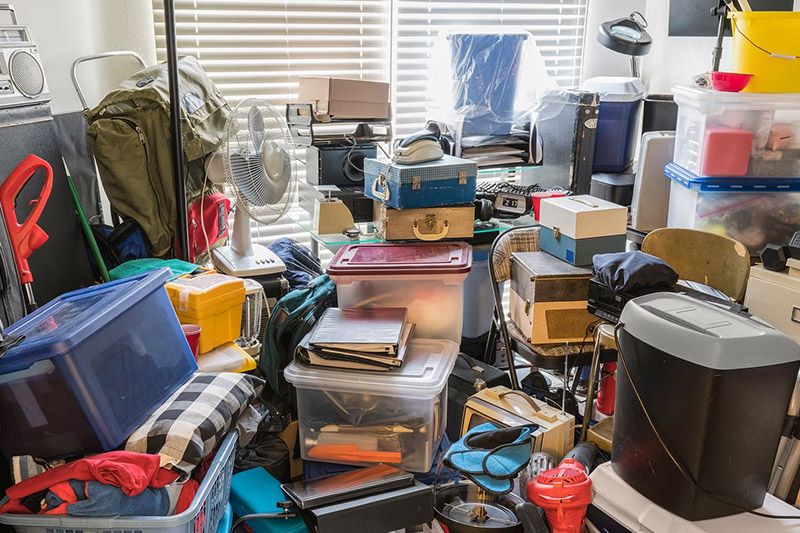What to Do When Your Senior Loved One Is a Hoarder
Hoarding behavior is the excessive collection of items, even if those items are worthless, hazardous, or unsanitary, and it can be particularly challenging to address when it occurs in seniors.
Hoarding can create unsafe living conditions and significant emotional distress for both seniors and their families. But often, any attempts to clean up the space or get rid of the person’s belongings result in fights, flaring tempers, hurt feelings, and a compulsion to hoard even more.
So what do you do when your senior loved one displays hoarding behavior? In this blog post, we’ll walk you through the signs of hoarding, strategies for addressing the behavior, and tips for helping your loved one maintain a clean and safe living environment.
Understanding Senior Hoarding
Most people start exhibiting hoarding behavior early in life, and there’s some indication that genetic predisposition plays a role. However, it can also be the result of the individual’s environment, a traumatic experience, or other health conditions.
For seniors, this behavior can be exacerbated by isolation, loss, or cognitive decline, making it difficult for them to part with possessions that they perceive as linked to their memories and identity.
Hoarding is classified by intensity, and hoarders tend to advance through these levels:
- Minimal: The person buys, keeps, and collects a lot of items, but they’re mostly organized and stored away, so there’s not much obvious clutter.
- Mild: There might be some cluttered areas, but overall, the living spaces are accessible and clean.
- Moderate: Clutter is piling up in living areas, making them inaccessible or difficult to use, and there are signs that the home is not well cared for or healthy to live in (broken appliances, pet messes indoors, mold or mildew, etc.).
- Severe: The clutter has overtaken the home, leading to an unsafe and unsanitary environment. Often, there’s only a small path cleared between rooms, and you may have to climb over piles of clutter to access some spaces.
- Extreme: Movement throughout the home is extremely limited or impossible. Most, if not all, appliances and plumbing fixtures are broken or unusable, and there are likely severe infestations of insects or rodents.
As the hoarding intensifies, the person will often become overwhelmed, ashamed, and embarrassed by the mess. They may isolate themselves or lash out at family and friends to keep them away. And as much as they might like to live in a safe, clean home, they simply don’t have the mental capacity to even start addressing the issue.
Recognizing the Signs
Early intervention can prevent hoarding from becoming severe, so it’s important to take action as soon as symptoms appear. Signs of hoarding in seniors include:
- Clutter that blocks doorways and hallways
- Stacks of newspapers, magazines, or mail that are never thrown away
- Difficulty throwing away items, leading to excessive accumulation
- Poor hygiene and unsafe living conditions
- Isolation from family and friends
- Emotional distress when attempting to declutter
Strategies for addressing hoarding
Hoarding is a complex disorder, and hoarders often need extensive psychiatric help to manage the condition and clean up their living space. But compassionate and non-judgemental support can go a long way when it comes to encouraging them to accept the help they need. With that in mind, here’s how to start the process.
- Open communication: Begin by expressing your concerns in a non-confrontational way. Acknowledge the senior’s feelings about their possessions and emphasize your concern for their health and safety, rather than the state of their home.
- Enlist professional help: A psychologist or counselor trained in dealing with hoarding behavior can provide the necessary support, while professional cleanup crews can help with extreme hoards and biohazards. If necessary, you may need to contact Adult Protective Services, especially if your loved one is suffering from Alzheimer’s or dementia and refuses help.
- Gradual decluttering: Rapid, forced cleanouts can be traumatic. Instead, focus on gradual decluttering, starting with small, less emotionally charged areas. Set realistic goals and celebrate progress, no matter how small.
- Safety first: Address the most hazardous areas first. Remove items blocking exits and clear spaces near fire hazards like stoves and heaters. Ensure that medications are accessible and that the home is safe for living.
- Organize a support system: Engaging friends and family in the cleanup process can help, but it’s important to maintain respect for the senior’s autonomy. Use a team approach where the senior feels supported, not judged or overwhelmed.
- Regular follow-ups: Hoarding behavior can recur, so regular check-ins are essential. Keep up with ongoing visits to provide emotional support and ensure the living environment stays safe and healthy.
- Legal and financial considerations: In extreme cases, where the senior is at risk of eviction or legal consequences due to hoarding, legal advice may be necessary. A financial advisor can also help manage expenses related to cleaning and possibly repairing the home.
Creating a positive environment for your senior loved one
Encouraging a hoarder to get the help they need can lead to volatile emotions and outbursts. While they may understand that the hoard has to go and that their living situation is unsafe, the shame and embarrassment lead them to lash out.
So approach the situation with empathy and patience. Remember that your loved one is likely struggling with emotional or cognitive challenges that make decluttering particularly difficult. Emphasize the benefits of a clean living space for health and well-being, and help them visualize and work toward a safer, more comfortable home environment.
Maintaining the progress long term
Handling hoarding behavior in seniors requires sensitivity, patience, and a focus on safety and mental health. By approaching the issue with compassion and understanding, and by enlisting professional help, families can help their loved ones live more comfortably and safely.
Remember, the goal is not just to clear a home of clutter, but to improve your loved one’s quality of life.
At Right Hand Senior Care, our mission is to help all seniors live happy, safe, and fulfilling lives. If you’re looking for affordable, compassionate in-home care for your senior loved one, our skilled caregivers are ready to assist.
For more information on our in-home care services or to set up a care plan, contact us today.

We are Superheroes in Comfortable Clothes™
We take care of our clients, their families, our staff, and our league of franchise owners.

